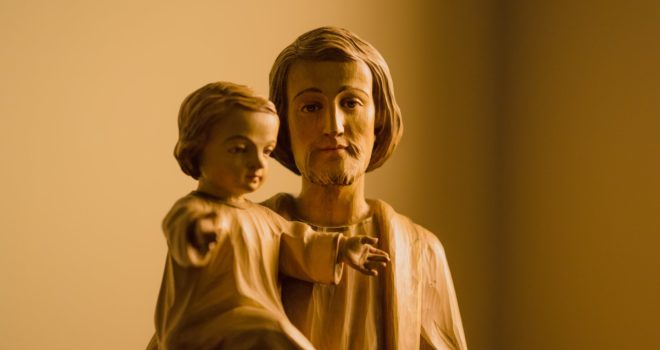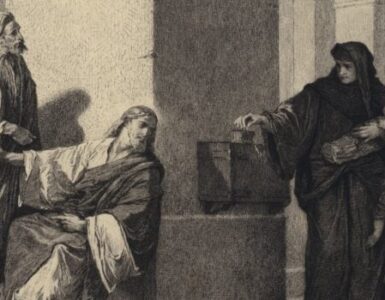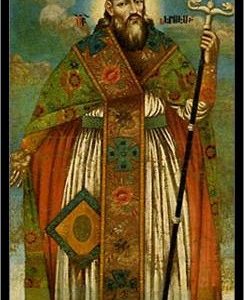The What and Why of “Consecration” to St. Joseph
Consecration is a hard concept to wrap one’s head around—at least in a theologically accurate way. “Consecration to” the Blessed Mother has been growing in the Church’s awareness over the past several centuries, but what does it mean to be consecrated to St. Joseph?
Saint Teresa of Avila, of course, strongly encouraged others to follow her lead in commending herself to Joseph’s intercession, but speaking of consecration to Joseph seems relatively recent.
I recently finished a book on the subject, Custos, Total Consecration to St. Joseph. Custos is Latin for “Guardian”—referring to Joseph’s role in the Holy Family and the Church, and this book stood out to me for its measured approach to the subject and the way it restricts itself to what is known of Joseph from Sacred Scripture (as opposed to private revelations that lack the Church’s approval).
The author of Custos, Devin Schadt, was kind enough to answer a few questions for CE’s readers.
Shane Kapler: I’ve always associated 33-day consecrations with the length of Jesus’s earthly life; but you have a different rationale. Please explain.
Devin Schadt: The reason Custos runs thirty-three days is highly symbolic. On October 13th, 1884, Pope Leo XIII, after offering the Holy Sacrifice of the Mass, fell unconscious. After waking, he related that he heard the devil threatening that he could destroy the Catholic Church within a one-hundred-year period.
Thirty-three years later—to the exact date—October 13th, 1917, heaven responded with the final apparition at Fatima. After an initial vision of Mary, the visionaries saw St. Joseph with the child Jesus. As this occurred, 70,000 pilgrims witnessed the sun zigzag, dart, and then plunge toward them. They screamed and confessed their sins.
It was at this moment that St. Joseph and the child Jesus simultaneously blessed the world; and the sun returned to its correct place in the sky. The visionaries then saw Mary, Joseph, and Jesus together as the Holy Family.
The message of Fatima is that Mary’s Immaculate Heart will Triumph. Mary showed us the secret to winning the war on evil and secularism: St. Joseph and fatherhood. Mary, in a sense, is saying, “Go to Joseph, what he says, you do” (Gen 41:55). As God said through the prophet Malachi,
“Before that great and terrible day, I will turn the hearts of fathers toward their children, and the hearts of children toward their fathers” (see Mal 4:5-6).
Fatherhood and St. Joseph—and St. Joseph’s fatherhood—are key to the redemption, revitalization and renewal of the Church, the family, and world. Society goes by way of the family; the family goes by way of the father.
Kapler: When you write of “consecration” you distinguish between consecration as an “act of the virtue of religion” and consecration as an “act of the virtue of charity.” That’s an important point. Would you flesh that out for readers?
Schadt: To be consecrated to God means to belong to him willingly, exclusively, and entirely, soul and body, forever. Think religious vows.
The other act of consecration is where we consecrate ourselves to another human being by means of a vow, such as marriage. This consecration is an act of divine love, a commitment to love the chosen person all the days of their lives, for their good.
To be concentrated to Mary and Joseph means to belong to them as children “belong” to their mother and father. We ask them to direct our lives, as parents do for their children. Parents direct and consecrate their children to God, not themselves. It is important that we understand this distinction. We are not consecrated to Mary or Joseph as an end in itself. Rather, they consecrate us to God because we have willingly surrendered ourselves to them.
Kapler: Fr. Calloway’s Consecration to St. Joseph came out in 2020. How is your book different from his?
Schadt: I actually completed the rough draft of Custos, Total Consecration to St. Joseph prior to Fr. Donald Calloway announcing that he was creating a consecration to St. Joseph. It seems that God is calling all hands-on deck to highlight the vital importance of this fatherly saint. Yet, as God would have it, the release of Custos coincided with Pope Francis proclaiming a Year to St. Joseph.
Custos differs from Fr. Calloway’s version in several ways. Father Calloway’s book looks at St. Joseph as the patron of the Catholic Church, that is, all believers. Custos, on the other hand, is addressed specifically to men called to be husbands and fathers, or spiritual fathers. Custos helps men shoulder up with St. Joseph, learning from his heroic example how to embrace the call to sanctity as a husband and a father.
It is also powerfully unique in that, instead of consisting of thirty-three days of reading reflections, it comprises seven stages of St. Joseph’s life; and each stage has very practical spiritual practices. At each stage, a man selects one or two of these practices. As he enters the next stage, he adds another spiritual practice to complement what he is already doing. By doing this, he gradually develops a solid pattern for holiness in his life.
We want men to not only read and learn about St. Joseph, but to live his spirituality and embody it in their vocation. My hope is that when men complete day 33, they will have a spiritual blueprint they can follow for the rest of their lives.
We have many consecrations that are strictly to the Blessed Mother. We have others to St. Joseph. As Christians, we are called to be alter Christus—another Christ. Therefore, our lives should participate in His life and reflect how He lived. When the days of Mary’s purification had been completed, the Blessed Virgin in union with St. Joseph, consecrated Jesus to God in the temple.
Mary and Joseph, as Jesus’ parents, consecrated him to God, that He might be holy—set apart for His mission. As brothers to Christ, Mary and Joseph are also our parents in the order of grace. Custos allows them to do for us what they did for Jesus: consecrate us through Jesus, with Jesus, and in Jesus, to God our Father, that we may be set apart for a sacred mission unto God.
Kapler: This consecration is also reliant on divine revelation, correct?
Schadt: Yes, it is a biblical journey with St. Joseph, basing its thirty-three daily reflections solely on divine revelation (Sacred Scripture) as given to us by the Catholic Church. Considering this, Custos refers to only those scriptures regarding St. Joseph, chronologically, allowing us to journey with him through his life.
My intent was to focus strictly on what God has revealed to us through divine revelation in hopes of encountering the real St. Joseph. Over the centuries, many legends and fantastic ideas regarding St. Joseph have been conceived, received, and believed as the Gospel truth, depicting St. Joseph as a superhero. Often people will speak of a virtue and then graft St. Joseph’s legendary life onto that teaching. Custos is exegetical, that the meaning of St. Joseph’s life comes directly out of the biblical text.
What is so admirable about St. Joseph was that he was a man’s man. He is an inspiring, silent, hard-working, strong, resolute witness to the truth that a common man can be heroic and change the course of history by living a silent, hidden, humble life. St. Joseph demonstrates we don’t have to be Braveheart or Wolverine to be great. We need to be like St. Joseph, a man who wrestled with evil, and came out victorious by fulfilling his vocational duties with fidelity, courage, and honor.
Kapler: You write powerfully of St. Joseph’s role in procuring graces for husbands and fathers. What encouragement can St. Joseph give to men who have already experienced divorce or the pain of a child drifting away from Christ?
Schadt: Joseph understands the pain of separation. He separated from the Blessed Virgin Mary, his wife, when he discovered that she was pregnant without his cooperation. He lost his son, Jesus, in the temple. Joseph knows the pain of loss.
When the scriptures say that St. Joseph “pondered” on his situation with Mary’s pregnancy, the Greek work rendered ponder is enthumeomai, which is taken from the root word thymos. For Greeks, thymos was the masculine spirit that enabled a man to be courageous, to fight, and to overcome. Enthumeomai means to have a passionate response, a courageous, grieving spirit.
St. Joseph wrestled and grieved over his loss, yet he submitted in trust to God his Father, waiting for God to direct him. This is the key to the man of God. He is not passionless. He channels his passions, even his grief and anger, submitting them to God.
St. Joseph, in my opinion, teaches us that the success of a husband and a father is not based on his wife’s and children’s holiness, but rather on his faithfulness. St. Joseph was, and is, a very real man, with very real challenges. He was no sugar-coated saint. St. Francis de Sales tells us,
“It is not those who commit the least faults who are most holy, but those who have the greatest courage, the greatest generosity, the greatest love, who make the boldest efforts to overcome themselves, and are not immoderately apprehensive of tripping.”
St. Joseph was such a man.
We can “go to Joseph” with our trials, tests and temptations and he, who acted most courageously and generously amidst such tests and temptations, can obtain all for us as he did for his Holy Family.












